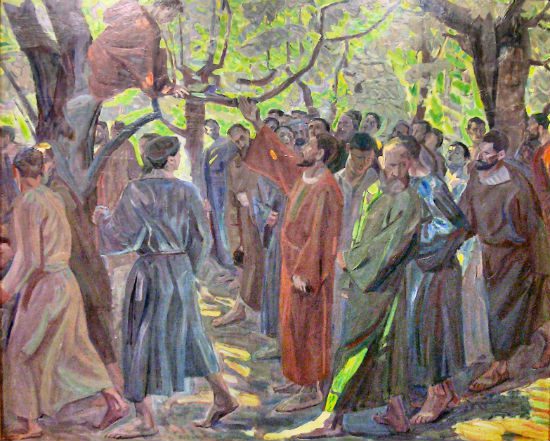I’m an evangelical Christian (albeit one who is now, I’m often told, unsanctioned, exiled/expelled). So I retain the evangelical belief that everybody can be saved — can be liberated and reborn and transformed. When I see someone expressing hateful ideas or living a life shaped by resentment of those who are worse off, I reflexively think, “That person needs Jesus.”
And let me be very clear: I believe that’s true. I believe they do. (I do. We do, etc.)
The problem, though, is that nine times out of 10 here in the US of A, it turns out that person already has Jesus. They know and believe in some version of Jesus, anyway, one they learned from their parents and their church and maybe even their Christian school or Bible college. And the Jesus they know and follow, worship and pray to, turns out to be a Jesus who shares their hateful ideas and blesses their punching-down resentment.
So it doesn’t seem like a big come-to-Jesus moment poses any threat to injustice, oppression or mass-plunder. Or even that a massive outpouring of some spiritual something that produced tens of millions of such come-to-Jesus moments would change much of anything.
I still retain my evangelical impulse to look at any massive social injustice and think: We need another Great Awakening. We need revival, repentance, and conversion to a new way of life. But when that thought comes to me now, I don’t invest much hope in it.

For one thing, I’ve studied enough about Great Awakenings to realize they’re really not that great. No matter how widespread the “awakening” seemed to be, it didn’t help most people get woke or stay so. Consider the First Great Awakening, led by figures like Jonathan Edwards and George Whitefield. Edwards was interested in eschatological justice for sinners, but not terribly interested in justice here in this life. Whitefield, on the other hand, proved to be an effective campaigner for political and social change — he helped to legalize slavery in the colony of Georgia so that he could run a more profitable plantation.
The Second Great Awakening is perhaps a bit more hopeful. It was led by folks like Charles G. Finney, who argued for abolition and women’s suffrage (and temperance, and anti-Masonry, and other causes of the day that haven’t aged quite as well). But the revivalism of this period didn’t always, or even usually, include such integral concern for justice. Confederate soldiers, too, saw Jesus in the watchfires of a hundred circling camps. And many of the revived and awakened took up arms again after the war, leading or joining the terrorist militias that repealed and replaced Reconstruction, imposing a century of Jim Crow in Jesus name, Amen.
Some religious historians talk of a third and even a fourth “Great Awakening,” but the evidence for any such thing is not terribly convincing, and the idea is depressing to contemplate. The claim that such events ever took place requires us to define Great Awakening down to something utterly inconsequential.* (If a Great Awakening falls in the forest and nobody hears it, does it still make a noise? What if they threw a Great Awakening and nobody came?)
I still appreciate the idea of such a thing. I see the resurgent ugliness of ethnic nationalism here in America and in Europe and I think that another Pentecost might be a very good thing right about now. But Pentecost is a church thing, and it’s no use looking to the church to provide the solution to a problem that seems most acute and most deeply rooted in our churches themselves. Frankly, it’s when I look at our churches that I most often think, “Those people need Jesus.”
Not that I’m giving up on our churches, mind you. Like I said, I still believe that everybody can be saved — even white American Christians. And our churches certainly have the resources and the stories that ought to enable them to rediscover the virtue and duty of solidarity, to repent from hatred and be liberated from resentment.
But such a rediscovery, should it occur within or without the church, suggests that our path forward lies in a “change of heart.”
George Orwell noted that “”A ‘change of heart’ is in fact the alibi of people who do not wish to endanger the status quo.” But he also conceded that the idea wasn’t necessarily pure humbug: “‘If [people] would behave decently the world would be decent’ is not such a platitude as it sounds.”
That’s from Orwell’s essay on Charles Dickens, whom Orwell loved, even though the great novelist seemed incapable of imagining any substantial, political, structural or institutional change:
It seems that in every attack Dickens makes upon society he is always pointing to a change of spirit rather than a change of structure. It is hopeless to try and pin him down to any definite remedy, still more to any political doctrine. His approach is always along the moral plane, and his attitude is sufficiently summed up in that remark about Strong’s school being as different from Creakle’s “as good is from evil” Two things can be very much alike and yet abysmally different. Heaven and Hell are in the same place. Useless to change institutions without a “change of heart” — that, essentially, is what he is always saying.
If that were all, he might be no more than a cheer-up writer, a reactionary humbug. A ‘change of heart’ is in fact the alibi of people who do not wish to endanger the status quo. But Dickens is not a humbug, except in minor matters, and the strongest single impression one carries away from his books is that of a hatred of tyranny. I said earlier that Dickens is not in the accepted sense a revolutionary writer. But it is not at all certain that a merely moral criticism of society may not be just as ‘revolutionary’ — and revolution, after all, means turning things upside down. … Progress is not an illusion, it happens, but it is slow and invariably disappointing. There is always a new tyrant waiting to take over from the old — generally not quite so bad, but still a tyrant. Consequently two viewpoints are always tenable. The one, how can you improve human nature until you have changed the system? The other, what is the use of changing the system before you have improved human nature? They appeal to different individuals, and they probably show a tendency to alternate in point of time. The moralist and the revolutionary are constantly undermining one another. … The central problem — how to prevent power from being abused — remains unsolved. Dickens, who had not the vision to see that private property is an obstructive nuisance, had the vision to see that. “If men would behave decently the world would be decent” is not such a platitude as it sounds.
In any case, though, the efficacy of a “change of heart” as a strategy relies on being able to answer a prior question: How can we bring about such a change? And how can we hope to do so on a large enough scale to change the big picture?
It’s one thing, after all, to smile at the happy ending for Tiny Tim thanks to Ebenezer Scrooge’s individual change of heart, but that doesn’t do anything to help any of the thousands of other poor and sick children in Dickens’ London. (We’re going to need more ghosts.)
The idea of Dickens’ Christmas Carol, I suppose, is that Scrooge is to serve as a model for social transformation based on individual transformation. The same could be argued for the story of Zacchaeus, on which Dickens’ story seems partly based. But Zacchaeus’ repentance involved his embrace of Jubilee — of a whole system and structure of economic justice, not just of his deciding to be a nicer person. Zacchaeus didn’t become a moralist, he joined a revolution. And he was only able to do that because there existed a revolution for him to join — one that consisted of something more substantial than just the maintenance of good cheer and Christmas spirit the whole year ’round.
A “change of heart,” I think, belongs more in the category of outcome. It’s a worthy goal, but not also the path to achieving itself. And it requires some idea of what it is that all these hearts are changing to.
– – – – – – – – – – – –
* The purported “Fourth Great Awakening,” if you’re interested, supposedly took place from ca. 1950-1980. I’d argue that this was, in fact, a period of religious revival, one in which prominent Christian leaders prophetically called for national repentance and rebirth. But the people who talk about a fourth Great Awakening ignore that. They’re not talking about the Civil Rights Movement, but about, like, Billy Graham and the explosive growth of Pentecostal churches.
















